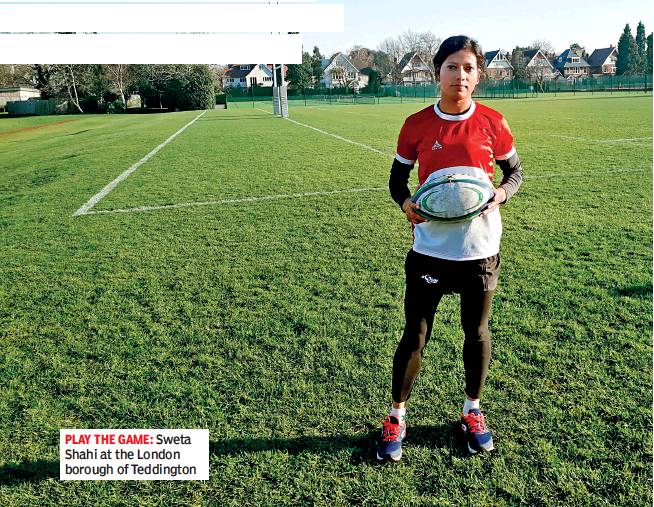Sweta Shahi
This is a collection of articles archived for the excellence of their content. |
A brief biography
Till 2019
NAOMI CANTON, May 23, 2019: The Times of India

From: NAOMI CANTON, May 23, 2019: The Times of India
So, what transformed this village girl from Nalanda with no hope and a distinct lack of confidence to a 20-year-old star in a global campaign video? It was no other game but rugby.
Hailing from Bhadari, Sweta Shahi shines bright in the latest World Rugby clip. The 20-year-old winger has represented India at three Asia Rugby Sevens tournaments, plays for the Bihar state team and coaches 100 players from her district, 70 of whom are men.
She is attending the national training camp next month and hopes to be selected for the national 15-member India women’s rugby team which is participating in the 2019 Asia Rugby Women’s Championship Division I in Manila in June.
“My family is not very rich. I come from a village in Nalanda district, Bihar which has just 500 people. My father Sujit Kumar is a farmer and my mother Champa Devi is a homemaker,” she told TOI.
“Nobody plays sports in my village. Those who were going to join the CRPF did but that was only for boys. The girls were not interested. Sometimes we played kabaddi,” she said.
In Bhadari, women get married in their teens and become housewives, she explained.
Posing at the Lensbury in Teddington for the new global campaign video to promote women’s rugby, which was launched worldwide on Tuesday, Sweta beams with confidence. “I never used to be able to speak publicly or so freely. I was shy. Rugby has improved my confidence. I used to be scared to answer the phone and now I am independent, travel on my own and make my own decisions and I am able to speak to senior authorities,” she said.
Shahi was scouted at an interdistrict athletics championships in Bihar in 2012 by the secretary of the Bihar rugby association who was looking for players for an upcoming tournament. She was only 12. “At that time, I did not know what the word rugby meant. No one from my family had seen rugby. It is not shown on TV in India. It is all online and we did not have a computer or smartphone,” she said.
The secretary explained the basic rules and she borrowed a smartphone from a villager to watch videos of the game on You-Tube with her father, who became her coach. But while he and her grandfather had words of encouragement, the rest of the family was against it. “They were worried I would injure myself and it would be a financial burden for the family,” she said.
Before long, she had torn the ligaments in her knee and broken her collar bone. Her father had to sell land to pay for the surgery. “That just made me stronger,” she said. “My mother’s brother (uncle) still pesters me to give it up. He says ‘There will be problems if you get injured. If you break your leg who will marry you?’ My friends are all married and are housewives. They are all a bit jealous of me. They are saying ‘don’t get married so fast and don’t be like us’”.
Sweta added: “In India, rugby is growing in popularity. I organised a tournament in my district with four to 500 players. At the beginning, people said why is a woman playing this game but not anymore. Forty per cent of rugby players in India are women.”
There is no dedicated training ground where she lives so she cycles six kilometres to the playground of her former school, the Rash Bihari High School in Nalanda, to practise. “It is rough, stony and not in good condition. We can only practise touch rugby and do fitness exercises, we can’t do contact training. I have met with lots of politicians to explain it but nothing has happened.”
Money is a stumbling block as she tries to make big strides in her career. “I just eat simple food. I can’t really afford a special diet. There is no salary or stipend in India as it is not a professional sport but I get occasional benefits. If I represent India, the association provides the kit. I travel extensively to district and state-level tournaments so there is a lot of cost. I also need equipment like rugby balls, tackle pads and headguards and scrum caps for me and my players,” she said.
“One problem is I need to learn English as I went to a Hindi-medium school. We speak mag ahi at home,” added Sweta, who went to Patliputra university in Patna.
But nothing has dissuaded her. “Rugby has developed me mentally as you have to really focus. I like the physical aspect of tackling, the scrum and the speed. I am very happy about what I have done. I have travelled out of India three times — to Sri Lanka, Dubai and London. I would never have done this if I had got married. I would have been in charge of the home, not have been able to leave the village. My mother is pressurising me to get married but I want to focus on sport at the moment. My dream is to play at the Olympics,” she said.